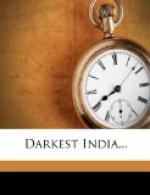What, then, is to be done? Punishment hardens the criminal, pardon encourages crime, while the hearts of the offenders remain the same!
Here steps in the Salvation Army. Its methods and meetings, however distasteful to the educated and refined, have a special attraction for these dangerous classes. Its Officers are accustomed to handle them with superhuman love and patience, as well as with a tact and adroitness such as has often elicited the admiration and praise of those who have no sympathy with our creed or ways of work.
We have all over the world fearlessly invaded these criminals in their lowest haunts and dens, in the teeth of the warnings of the Police; we have braved their fiercest fury when, urged on by publicans, maddened with drink, misled by all sorts of infamous lies, and winked at or patronised by the Police and Magistrates, they have wreaked on us the utmost cruelties. We have invariably weathered the storm, though often at the cost of health and even life itself. And in the end as a rule the Roughs, Criminals and Dangerous Classes have become our warmest friends and vigorous supporters. From amidst them we have rescued and reformed some of the noblest trophies of Divine grace. This has been done all over the world. It has been done in India and Ceylon. In a later part of this book we have given a glimpse of this most interesting and important portion of our work. Independent witnesses testify to its reality. Government officials assure us of their warmest sympathy, and in not a few cases aid us with their influence and subscriptions. In Ceylon the Government has treated us most handsomely, throwing open their prisons for our Officers to visit and hold meetings among the prisoners, assisting us in the expenses of our Home with a monthly grant of Rs. 100, and encouraging the criminal classes to take advantage of the opportunity thus afforded them for reforming their lives.
The common reason given for refusing such assistance elsewhere is that Government cannot interfere with the religion of the prisoners. But in Ceylon the majority of the prisoners are Buddhists, Hindoos and Mahommedans, and what has been found to work so well there can surely be tried with equal success elsewhere! Government does not hesitate all over India to assist religious bodies in their endeavours to educate the people, and they may therefore well countenance and help forward, as they might so easily do, our efforts to reach and reform the criminal classes on precisely the same grounds, offering similar advantages to any Hindoo or Mahommedan Associations that might afterwards be formed for the same purpose. At present the Indian criminal has no friend to lend him a helping hand. Prison officials in various places have personally informed me that they are distressed at being able to do nothing for criminals, who, having lost their character and being abandoned by their friends, have no alternative but to return to their




